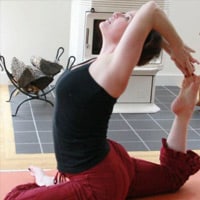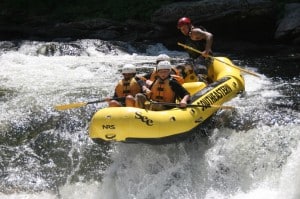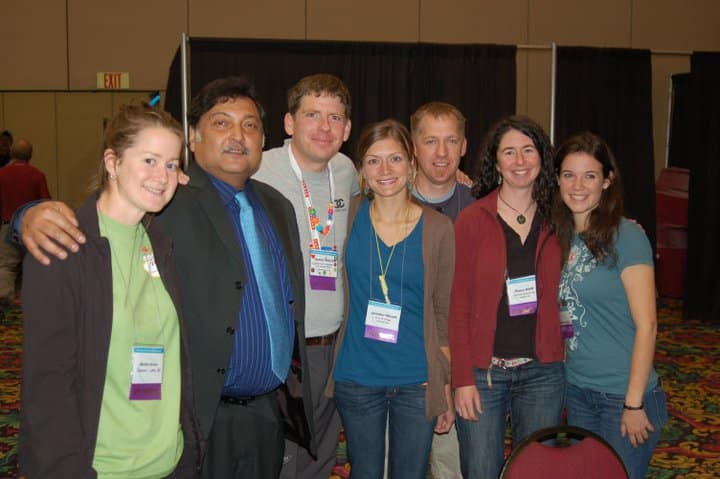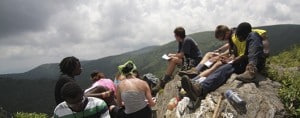Plan Now To Attend Outdoor Education Conferences
ConferencesIf you’re at all interested in a career in outdoor or adventure education and just don’t know where to start, we’re here to tell you that there are whole slew of outdoor education conferences that you can attend – and other things you can do right now – to improve your chance of being hired by a quality organization like The National Center for Outdoor & Adventure Education (NCOAE). For instance, you could:
- Become certified in wilderness medicine: There are lots of organizations that provide wilderness medicine training, including NCOAE. At a bare minimum, you should have your Wilderness First Responder certification if you’re serious about working in the outdoor education field.
- Learn about the theory of experiential education: We recommend reading Theory and Practice of Experiential Education. Published by the Association for Experiential Education (AEE), this book – which is now in its 4th edition – contains everything you need to know about both the theory behind – and practice of – experiential education.
- Join an industry membership association: All of the really great outdoor education practitioners belong to at least one industry membership or trade association. For a list of associations to consider joining, visit the NCOAE Resources page online
- Attend an outdoor industry conference or trade show: Once you know for sure that working in outdoor and experiential education is what you want to be doing, you should plan on attending at least one outdoor industry-related conference or trade show.
And speaking of outdoor industry conferences and trade shows, here’s a short rundown of the ones we feel you should know about: (more…)
Getting to the Core of the NCOAE Curriculum, Part 1
NCOAE CurriculumWhen it comes to describing the course of study for a school or university, the word “curriculum” is most often used, and it traditionally references all of the courses offered at a particular institution.
Curriculum has been described as “a path for students to follow,” which is actually fitting when you think about the backcountry activities that are so paramount to our offerings.
What makes that term specific to The National Center for Outdoor & Adventure Education (NCOAE) is that — while our emphasis is on skills related to backpacking, rock climbing, whitewater rafting and surfing — our curriculum doesn’t stop with those outdoor and technical skills.
Unlike many outdoor adventure and education programs, our core curriculum also has a focus on what we call “human” skills, with goals of providing a positive impact on our students’ leadership, communication and their civic and environmental responsibilities. By expanding our understanding of the word curriculum, we’re using experiential education to give our students what is sometimes called “action learning.”
What we’re most proud of is offering relevant and fulfilling educational experiences for youth and adults that are current, effective and rewarding. Our custom curriculum is based on experiential education, which means we value the process of learning actively and hands-on. We use activities and curricula that are problem-based and collaborative. The curriculum encourages our course participants to merge their new outdoor experience with their previous life experiences in order to confront and challenge “obstacles” and find solutions.
Our wilderness programs expose NCOAE course participants to a core curriculum, built upon Self, Community, Action and Impact. We factor in 11 topics to be addressed during the daily Educational Groups (known as “Ed Groups”), and these same 11 topics are revisited for reflection during evening Process Groups (known as “The Summit”).
Outdoor skills are related to students the moment they hit the trail and continue throughout the entire course. Our instructors take full advantage of (more…)
NCOAE Is Hiring
Working at NCOAE If you’ve spent any amount of time surfing our website or reading this blog, you know that working at The National Center for Outdoor & Adventure Education (NCOAE) is more than just a job. It’s a reward.
If you’ve spent any amount of time surfing our website or reading this blog, you know that working at The National Center for Outdoor & Adventure Education (NCOAE) is more than just a job. It’s a reward.
Working at NCOAE is a reward for many things, including: superior performance elsewhere; having a keen understanding of emotional intelligence and its impact on group dynamics; and, successfully teaching and guiding youths and adults in remote wilderness locations. Along the way, those who master technical outdoor skills – as evidenced by earning highly sought after certifications from organizations like the American Mountain Guides Association (AMGA) and the American Canoe Association (ACA) – also find that their hard work and dedication is potentially rewarded with an opportunity to work at The National center for Outdoor & Adventure Education.
In other words, working as an NCOAE outdoor educator, instructor or administrative staffer isn’t possible for everyone who applies. Instead, our employment openings – some of which are referenced below – are only available for the best of the best.
Currently, we’re actively pursuing applicants for these upcoming NCOAE job openings:
- NCOAE Course Director (This position oversees the safety, quality, and educational effectiveness of all of NCOAE courses. Your primary responsibilities in this job include: supervising and evaluating instructors, managing technical sites/activities, and overseeing all logistics of NCOAE courses in the field. That’s it? No, there’s more to this position than just that, of course; so for more information and a full job description, send an email of inquiry to hr@ncoae.org.)
- NCOAE Lead Instructor (This position is responsible for helping to manage the safety and wellbeing of all NCOAE students, and actively co-instructs while in the field. To learn more about this position, please send an email of inquiry to hr@ncoae.org.)
- NCOAE Assistant Field Instructor (As do all NCOAE wilderness instructor positions, this opportunity requires that you have a very solid understanding and knowledge of the inherent risks associated with backcountry travel in remote wilderness settings with groups, and that you have your Wilderness First Responder [WFR] and Leave No Trace [LNT] certifications. Learn more by sending an email message of inquiry to hr@ncoae.org.)
The hiring process here at NCOAE is fairly straightforward. You start by (more…)
Staff Profile: NCOAE Staff Trainer and Co-instructor, Jill Valle
Staff ProfilesEditor’s Note: The work we do here at The National Center for Outdoor & Adventure Education (NCOAE) matters because positive and profoundly empowering experiences are created when people choose to engage with themselves and one another in unique wilderness settings. With that in mind, we’re going to use our blog to introduce you to some of the very talented and highly skilled team members here at NCOAE who administer and guide our unique wilderness experience.
And here to start things off is Jill Valle, who earned her bachelor’s degree in psychology at Boston College and her master’s in counseling psychology from Lesley University. She is a licensed mental health counselor in Massachusetts and is a member of the California Association of Marriage and Family Therapists. Jill is also an outdoor educator and artist who has worked with adolescents and adults for the past 15 years. She adamantly believes that the power of creativity and the wilderness can foster growth and empowerment in individuals and groups.
But don’t take out word for it… here’s Jill, in her own words:
NCOAE: Tell us about a time when you realized you had the power to do something meaningful.
 Jill: When I was in college I was doing an internship in the inner city. It was a program that worked with at risk kids, helping them develop the skills to apply for, interview for and secure jobs in the community. I was most inspired by watching the students go through this process — the power of simply connecting with kids and allowing them to feel heard and seen, and supporting them in making a difference in their lives.
Jill: When I was in college I was doing an internship in the inner city. It was a program that worked with at risk kids, helping them develop the skills to apply for, interview for and secure jobs in the community. I was most inspired by watching the students go through this process — the power of simply connecting with kids and allowing them to feel heard and seen, and supporting them in making a difference in their lives.
NCOAE: What was your guiding light in choosing to work as an outdoor educator instead of choosing a career such as a lawyer, computer tech, business management, etc?
Jill: It wasn’t really a choice – I couldn’t imagine doing more “conventional” nine-to-five work. The guiding force was a drive to do work that was meaningful, inspiring, transformative and healing – all of which I find in outdoor education
NCOAE: What influenced your decision to work for NCOAE?
Jill: Celine Adair – NCOAE’s co-founder and operations director – and I met while facilitating outdoor education experiences for Maui Surfer Girls in Hawaii. Our connection was instant and our chemistry while leading groups together was natural, authentic and transformational for us and for our participants. NCOAE’s mission and vision aligns with my philosophy about learning, growth, development and life in general and it is a privilege to be a part of the team.
NCOAE: What do you think about when you are alone on the trail?
Jill: I think about the beauty around me, the gratitude I have for being outdoors, the miraculous ability of my body to carry me through this world. Sometimes I think about nothing except the sound of my breath. Sometimes my mind wanders. Sometimes I am fully in the moment with the sights, sounds, creatures I may encounter along the path. I think about how amazing the quiet can be and I listen. I listen for the deep murmuring of my heart and soul. Some of my best inspirations, ideas, and insights come to me when I am alone on the trail.
NCOAE: What gets you excited?
Jill: Tapping into creative energy and getting out of the way to let it move through me. There’s taking photographs and making art, a delicious meal shared with family and friends, road trips, spontaneous adventures, surfing, yoga, laughing long and hard, being outdoors in nature, train travel, thinking up my next (more…)
How To Prepare For A Teen Adventure Course
Teen Courses
Captioned Image…
If you’re thinking about enrolling in a Teen Adventure Course and you’re wondering how to prepare, then this blog post is for you!
It’s a daily occurrence here at The National Center for Outdoor & Adventure Education (NCOAE). Someone calls or writes to ask how should they prepare for one of our courses. And while enrolling and paying is a great start, there’s more to it than just that.
Below, we present a 30,000-foot overview of how to prepare for an outdoor adventure-based course offered by NCOAE.
Physical Fitness (‘drop and give me 20!’ NOT): While our courses never involve forced marches (we leave those ‘experiences’ to the military), you should be able to handle a serious of strenuous hikes over consecutive days. A good rule of thumb… place four gallon-jugs of water into a backpack and take a walk around your neighborhood. If you find it difficult to carry that amount of weight for more than five to 10 minutes, you’ll need to build some strength and endurance before showing up for your course. Four gallons of water, it turns out, weighs roughly 35lbs, which is just about equal to the weight of the gear you’ll be carrying on one of our teen adventure courses. If water isn’t your thing, here’s a short list of other ‘stuff’ that weighs approximately 35lbs:
- 7 reams of copy paper
- 560 pencils
- 3,350 pennies
- 3,175 nickels
- 7,000 dimes
- 2,800 quarters
- 7 five-pound bags of potatoes
At the end of each day on the trail, you and your course mates will be able to dump your packs and rest before gathering yourselves up to helping to prepare that night’s campsite and meal (which is another way of saying that once that 35lbs is off your back, there’s still some work left to do).
Fear not… if the 35lb thing turns you off or seems too strenuous, we offer a number of courses where the physical requirements aren’t as high (and for younger kids, your can throw the 35lb rule-of-thumb thing out the window). Give our office a call at (910) 399-8090 to learn which of our courses is right for you.
Comfort Zone (let’s step out of it): Participating in an NCOAE adventure involves more than strapping on a backpack and trekking over and alongside scenic trails, peaks and waterways. Being willing to step out of your physical and emotional comfort zone is a must when traveling in a group of 10-12 of your peers. This means sharing your (more…)
TALK TO US
Have any further questions about our courses, what you’ll learn, or what else to expect? Contact us, we’re here to help!

